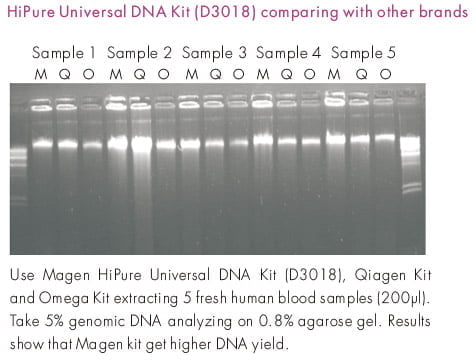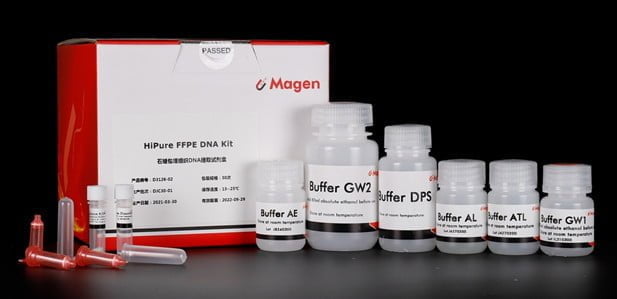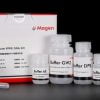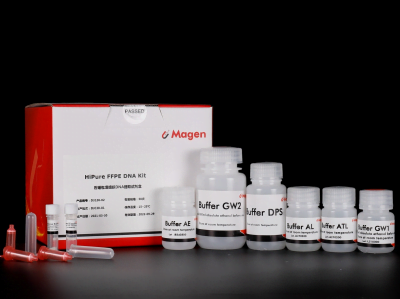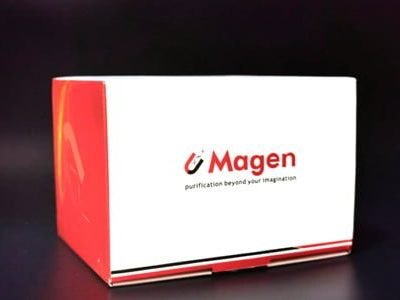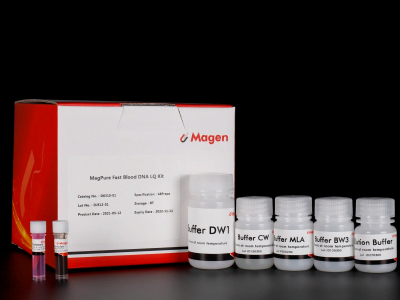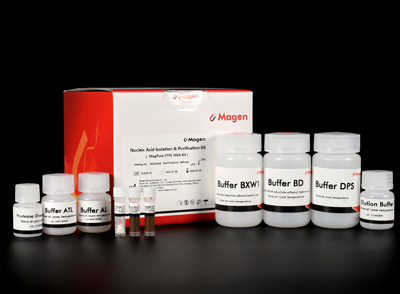This product offers a convenient and rapid method to purify total DNA from a wide range of samples, making it ideal for various downstream analyses:
- Fast and Efficient: The protocol is streamlined for quick DNA extraction with minimal hands-on time.
- High-Quality DNA: The system isolates total DNA (génomique, viral, mitochondriale) with high purity, suitable for reliable RAP, quantitative PCR (qPCR), Southern Blot, and viral DNA detection.
- Broad Sample Compatibility: The method effectively purifies DNA from a variety of sources, y compris:
- Tissu
- Cells
- Sang
- Saliva
- Swabs
- Blood Spots
- Semen
- Other clinical samples
- Downstream Applications: The purified DNA can be used directly in various research techniques, y compris:
- RAP (Réaction en chaîne par polymérase)
- qPCR (quantitative PCR)
- Southern Blotting
- Viral DNA Detection
- Other DNA-based analyses
This solution simplifies DNA extraction while maintaining high quality, making it a valuable tool for researchers working in various fields of molecular biology, forensics, and diagnostics.
Caractéristiques
| Caractéristiques | Caractéristiques |
| Fonctions principales | Isolation of total DNA from tissue/blood/body fluid/swab/dry blood spots |
| Applications | RAP, qPCR, boulon du sud et détection de virus, etc. |
| Méthode de purification | Mini spin column |
| Technologie de purification | Technologie de la silice |
| Méthode de processus | Manuel (centrifugation ou vide) |
| Échantillon type | Tissu, cellules, sang, saliva, swabs, blood spots, semen, and other clinical samples |
| Montant de l'échantillon | Solid tissue: 1-10mg; Sang anticoagulant: 200µl |
| Volume d'élution | ≥20μl |
| Temps par course | 30 – 60 minutes |
| Volume de liquide transporté par colonne | 800µl |
| Rendement de liaison de la colonne | 100µg |
Principe
- Purification Method: Utilizes silica column purification for efficient nucleic acid extraction.
- Sample Lysis and Digestion: Samples are lysed and digested using lysate and protease, facilitating the release of DNA into the lysate.
- Nucleic Acid Adsorption: The lysed sample is transferred to an adsorption column, where nucleic acids selectively adsorb onto the membrane.
- Protein Removal: Proteins, which do not adsorb to the membrane, are removed through filtration, ensuring purity of the extracted nucleic acid.
- Washing Step: Proteins and other impurities are washed away from the membrane to enhance the purity of the extracted nucleic acid.
- Elution: Nucleic acid is finally eluted from the membrane using a low-salt buffer (10mmTris, pH 9.0, 0.5mmEDTA), resulting in efficient recovery of high-quality nucleic acid.
Avantages
- High-quality DNA – meets a variety of downstream applications, including PCR, qPCR, enzyme digestion, hybridization, etc..
- Rapide – without separation of leukocytes, organic extraction, or ethanol precipitation
- Simple – all nucleic acids can be obtained by direct digestion
- Large applicabilité- handle a variety of liquid samples
Contenu du kit
| Contenu | D301802 | D301803 |
| Temps de purification | 50 | 250 |
| HiPure DNA Mini Columns I | 50 | 250 |
| 2Tubes de prélèvement ml | 100 | 500 |
| Tampon ATL | 30 ml | 150 ml |
| Tampon AL | 30 ml | 150 ml |
| Tampon GW1 | 22 ml | 88 ml |
| Tampon GW2 | 12 ml | 50 ml |
| Protéinase K | 24 mg | 120 mg |
| Tampon de dissolution de protéase | 1.8 ml | 10 ml |
| Tampon AE | 15 ml | 60 ml |
Stockage et stabilité
- Proteinase K Storage: Upon arrival, store Proteinase K at 2-8°C. Short-term storage (jusqu'à 12 semaines) à température ambiante (15-25°C) is acceptable without affecting performance.
- Remaining Kit Components Storage: Les composants restants du kit peuvent être conservés à température ambiante (15-25°C) and remain stable for at least 18 mois dans ces conditions.
- Whole Kit Storage: The entire kit can also be stored at 2-8°C. Cependant, in this case, les tampons doivent être redissous avant utilisation. Ensure all buffers are at room temperature when used for optimal performance.
Données d'expérimentation
